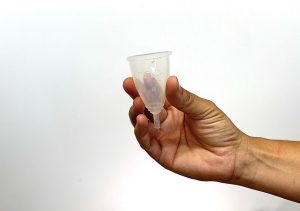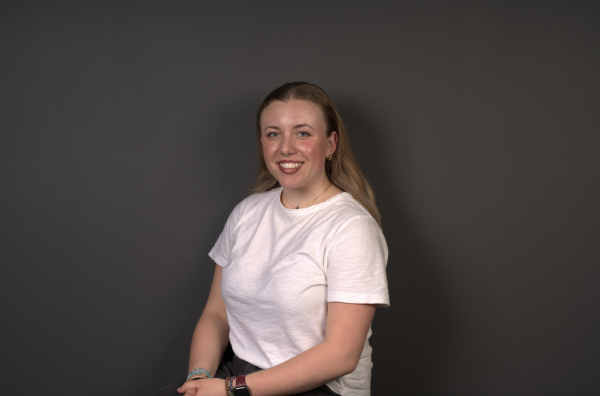Go Green for Menstrual Hygiene
March 9, 2022
In five years, undergraduate students at UW Oshkosh will use more than 6.8 million tampons with plastic applicators, all ending up in the landfill. The cost to the environment and individual students is staggering, yet many don’t even realize it.
As part of Womxn’s HERstory Month, Brianna Storino presented the Go Green for Menstrual Hygiene workshop at the UWO Women’s Center on March 7.
Storino, a geology major, has a love for nature and all things sustainability, which led her to running the menstrual equity project after doing a work study at the Women’s Center.
The workshop was started by the Oshkosh Student Association in 2018 in hopes of decreasing menstrual products’ environmental impact and working to make menstrual products financially sustainable. The overarching theme of the night: destigmatize the talk about menstruation.

Switching to a menstrual cup is one way to prevent waste in menstrual products.
Storino’s lighthearted approach to the topic of menstruation helped the group loosen up and feel comfortable sharing their personal experiences with menstruation.
Over five years, the average student will use somewhere around 900 tampons with plastic applicators and 225 panty liners or pads with plastic lining and adhesive, all of which will eventually make its way into the waste management system.
In five years, the average number of tampons with plastic applicators used by undergraduate students will be somewhere around 6,874,200, Storino said. When you add the amount of tampons used by graduate students to the undergraduates total, the UWO campus will add 7.2 million tampons/applicators to the waste management system.
Plastics like polyethylene require an intensive energy process to produce. This process results in a vast amount of CO₂ emissions, ramping up the average menstruators carbon footprint to 5.2kg through menstrual hygiene products alone.
By switching to sustainable hygiene products, the carbon footprint drops to 3.2kg. “That’s about a 30% reduction,” Storino said.
The average menstruator will spend $6,360 on menstrual products in their lifetime.
Storino said sustainability isn’t just about making a positive impact on the environment. Reusable menstrual hygiene products can be more cost effective for those experiencing period poverty, which is inadequate access to menstrual hygiene tools and education. Products like the Diva Cup, a reusable silicone cup used for catching menstrual blood, can last anywhere from 8-10 years if taken care of properly.
That’s a one time purchase every 8-10 years as opposed to buying a new box of tampons every month.
Jasmine Anderson and Mackenzie Navis are doing their Community Health Certificate placement with the Women’s Center.
Anderson and Navis are working together to pilot a program that will place menstrual hygiene products in all academic buildings on campus. As this project is currently a work in progress, keep an eye out for bulletin boards and flyers throughout campus.
“Anyone can get free or low-cost hygiene products on campus,” Anderson said.
The Cabinet, UWO’s food pantry, allows for students to come and take as many products as they need free of charge once a week with their Titan ID. The Cabinet is always looking for products to be donated.
By attending a Go Green for Menstrual Hygiene workshop, students can receive a free Diva Cup, reusable pad and/or organic tampons. The Women’s Center also always has menstrual hygiene products free of charge for anyone who might need them.
“Many people are being impacted by the issues related to menstrual hygiene and I don’t think it’s OK for this to be an issue for a single person, so something needs to be done,” Navis said. “I think spreading awareness is the first step to fixing these problems.”
Anderson said she wanted to spread awareness because she only recently realized there was an insecurity on menstrual hygiene. “[It’s] something that individuals who menstruate often struggle with monthly,” she said. “Having a period isn’t really something individuals can choose when to have. Financial insecurities can lead to poor menstrual hygiene. I wanted to spread awareness because I also didn’t realize the lack of resources that were promoted to campus individuals.”
The Women’s Center is working hard with passionate people to create awareness and positive change for those who menstruate. The Go Green for Menstrual Hygiene workshop runs two to three times per month, with an option to schedule a time that works for you and your friends. To learn more, visit uwosh.edu/womenscenter.














